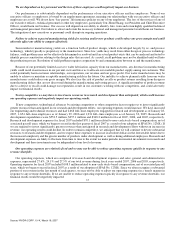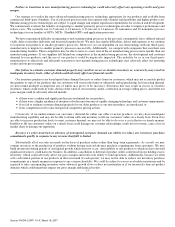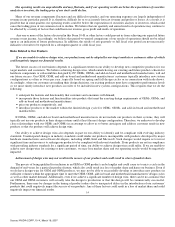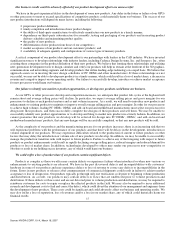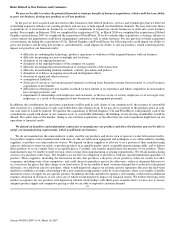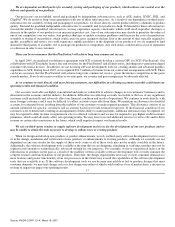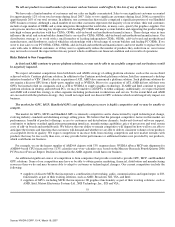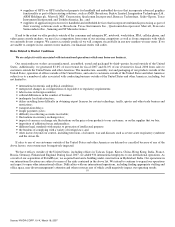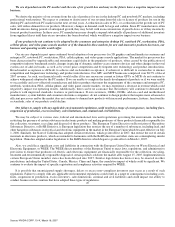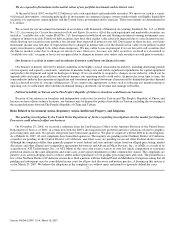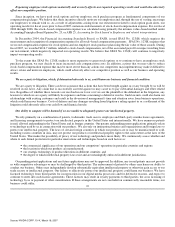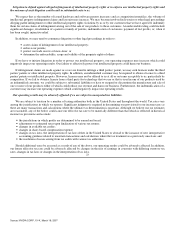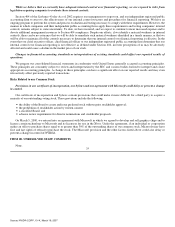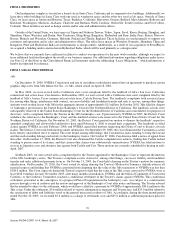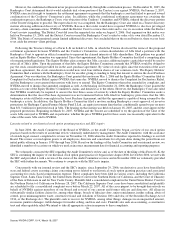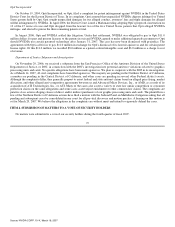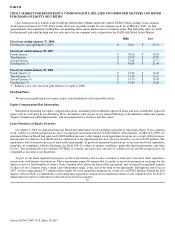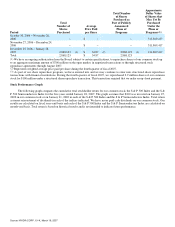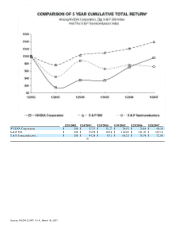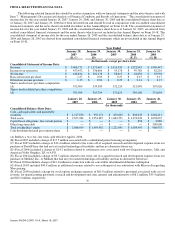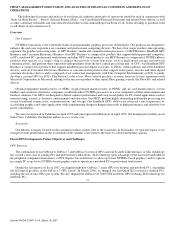NVIDIA 2007 Annual Report Download - page 28
Download and view the complete annual report
Please find page 28 of the 2007 NVIDIA annual report below. You can navigate through the pages in the report by either clicking on the pages listed below, or by using the keyword search tool below to find specific information within the annual report.
Expensing employee stock options materially and aversely affects our reported operating results and could also adversely
affect our competitive position.
Since inception, we have used stock options and our employee stock purchase program as fundamental components of our
compensation packages. We believe that these incentives directly motivate our employees and, through the use of vesting, encourage
our employees to remain with us. As a result of adjustments arising from our restatement related to stock option grant dates, our
operating results for fiscal years prior to fiscal 2007 contain recorded amounts of stock−based compensation expense. For our fiscal
2000 through 2006, this stock−based compensation expense was calculated using primarily the intrinsic value−based method under
Accounting Principles Board Opinion No. 25, or APB 25, Accounting for Stock Issued to Employees and related interpretations.
In December 2004, the Financial Accounting Standards Board, or FASB, issued SFAS No. 123(R) which requires the
measurement and recognition of compensation expense for all stock−based compensation payments. SFAS No. 123(R) requires that
we record compensation expense for stock options and our employee stock purchase plan using the fair value of those awards. During
fiscal 2007, we recorded $116.7 million, related to stock−based compensation, net of the associated payroll tax impact resulting from
our restatement, which negatively impacted our operating results. We believe that SFAS No. 123(R) will continue to negatively
impact our operating results.
To the extent that SFAS No. 123(R) makes it more expensive to grant stock options or to continue to have an employee stock
purchase program, we may decide to incur increased cash compensation costs. In addition, actions that we may take to reduce
stock−based compensation expense that may be more severe than any actions our competitors may implement may make it difficult to
attract, retain and motivate employees, which could adversely affect our competitive position as well as our business and operating
results.
We are a party to litigation, which, if determined adversely to us, could harm our business and financial condition.
We are a party to litigation. There can be no assurance that actions that have been brought against us or any brought by us will be
resolved in our favor. Any claim that is successfully asserted against us may cause us to pay substantial damages and other related
fees. Regardless of whether these lawsuits are resolved in our favor or if we are the plaintiff or the defendant in the litigation, any
lawsuits to which we are a party will likely be expensive and time consuming to defend or resolve. Such lawsuits could also harm our
relationships with existing customers and result in the diversion of management's time and attention away from business operations,
which could harm our business. Costs of defense and any damages resulting from litigation a ruling against us or a settlement of the
litigation could adversely affect our cash flow and financial results.
Our ability to compete will be harmed if we are unable to adequately protect our intellectual property.
We rely primarily on a combination of patents, trademarks, trade secrets, employee and third−party nondisclosure agreements,
and licensing arrangements to protect our intellectual property in the United States and internationally. We have numerous patents
issued, allowed and pending in the United States and in foreign countries. Our patents and pending patent applications primarily relate
to technology used by us in connection with our products. We also rely on international treaties and organizations and foreign laws to
protect our intellectual property. The laws of certain foreign countries in which our products are or may be manufactured or sold,
including various countries in Asia, may not protect our products or intellectual property rights to the same extent as the laws of the
United States. This makes the possibility of piracy of our technology and products more likely. We continuously assess whether and
where to seek formal protection for particular innovations and technologies based on such factors as:
• the commercial significance of our operations and our competitors' operations in particular countries and regions;
• the location in which our products are manufactured;
• our strategic technology or product directions in different countries; and
• the degree to which intellectual property laws exist and are meaningfully enforced in different jurisdictions.
Our pending patent applications and any future applications may not be approved. In addition, any issued patents may not provide
us with competitive advantages or may be challenged by third parties. The enforcement of patents by others may harm our ability to
conduct our business. Others may independently develop substantially equivalent intellectual property or otherwise gain access to our
trade secrets or intellectual property. Our failure to effectively protect our intellectual property could harm our business. We have
licensed technology from third parties for incorporation in our digital media processors and for defensive reasons, and expect to
continue to enter into such license agreements. These licenses may result in royalty payments to third parties, the cross licensing of
technology by us or payment of other consideration. If these arrangements are not concluded on commercially reasonable terms, our
business could suffer. 22
Source: NVIDIA CORP, 10−K, March 16, 2007


